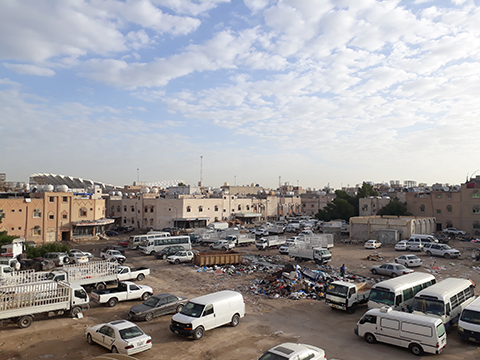
The recent rains and flooding swamped many parts of Kuwait, leading to widespread disruption and damage. These areas have now mostly returned to normal, with the waterlogging seen as an inconvenience that has passed. But for residents of Jleeb Al-Shuyoukh, particularly block 3, flooded roads are a perennial problem - the streets here are inundated not by rainwater, but raw sewage. Their predicament is exacerbated by mounds of uncollected garbage and other waste, which could become a public health hazard if left unchecked.
The common theme among residents of the area - colloquially known as Hasawi - is one of abandonment. "There are no services provided here. After the new university is built in Shadadiya, it seems this entire area will be razed to the ground. So why bother developing it?" an Egyptian resident told Kuwait Times. "The government has abandoned us because we are poor," echoed a Bangladeshi resident.
A Pakistani compared the situation of residents of the area to that of Pashtuns in the tribal frontier areas of Pakistan and Afghanistan. "They were told they were brave like lions and were exhorted to fight against the Soviets. But after the Soviets were driven out, they were labeled as terrorists and left to fend for themselves," he rued. Residents repeatedly mentioned the case of a woman who died after being electrocuted when rising rainwaters came in contact with exposed electric cables.
Thriving
The canopy of the iconic Jaber Stadium in Ardiya peeks over the dilapidated buildings in the area, a juxtaposition that is both jarring and poignant. The air hangs heavy with the putrid stench of garbage rotting under the sun and the continuous flow of sewage water from the open drains. Swarms of flies are everywhere. But surprisingly, for a place that looks completely uninhabitable, tens of thousands of expats call it home. Ironically, thousands of street cleaners also have accommodations here, overlooking streets and yards overflowing with rubbish.
The signboards of many shops in Jleeb are in Bangla (mostly in Hasawi) and occasionally Malayalam (in another part of Jleeb informally known as Abbasiya), reflecting the nationalities of the expats residing in these parts. Business is brisk, both legal and illegal.
On one side of a "rivulet" of sewage water in Hasawi, some enterprising women have set up semi-permanent stalls selling used clothing. On the other "bank", hawkers sell fruits and vegetables. A modern mosque towers by the side of the yard, flanked by a squat building that has a branch of a popular supermarket chain, a bunch of exchange shops thronged by expats remitting money home, restaurants, a salon, mobile accessory shops and other retail outlets.
A few hundred meters away, a mini-roundabout leads to another flooded street. The accumulated water hides the potholes underneath, so cautious motorists try to skirt the narrow road, leading to traffic jams. Patrons of a cafe on the side of the roundabout sit around open-air tables, eating, smoking and chatting, seemingly oblivious to the streets and buildings crumbling around them.
Otherworldly
The dystopian atmosphere of Jleeb is best witnessed before dawn, when hordes of menial workers emerge from the bowels of the area and walk towards the Sixth Ring Road to board buses that will take them to their worksites. Many are "loose" laborers hoping to find casual work. The surreal sight is reminiscent of the great migration of wildebeest in the Serengeti or zombies shuffling in the dark in the "Thriller" video. Public buses and "one-eight" pickups stop in the middle of the road and do not budge until they find enough passengers, with nary a traffic police car in sight. "There's jungle raj here," an Indian expat said, using a popular South Asian term to refer to a lack of the rule of law.
The area has become so notorious that the US Department of State specifically mentions in its Kuwait travel advisory Jleeb Al-Shuyoukh - along with Jahra - as places Americans should avoid visiting. "The Kuwaiti ministry of interior has identified the neighborhood of Jleeb Al-Shuyoukh on the outskirts of Kuwait International Airport as a high-crime area. Violent crime such as assault, armed robbery and sexual assault in Jleeb Al-Shuyoukh is common," it reads.
But residents beg to differ, arguing that although the area is dirty, it is not dangerous. Despite the poor infrastructure and dearth of public services, Jleeb has a large number of schools and clinics, along with branches of all major banks and supermarkets, jewelry shops, malls and government establishments. The expats who live here know their stay in Kuwait is transient, so they put up with many indignities in their bid to survive cheaply, and soldier on. Or as Oscar Wilde said: "We are all in the gutter, but some of us are looking at the stars."
By Shakir Reshamwala










